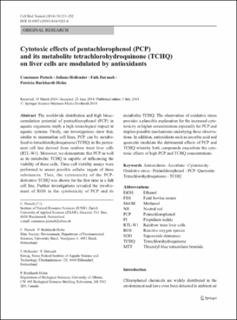Please use this identifier to cite or link to this item:
https://doi.org/10.21256/zhaw-3393| Publication type: | Article in scientific journal |
| Type of review: | Peer review (publication) |
| Title: | Cytotoxic effects of pentachlorophenol (PCP) and its metabolite tetrachlorohydroquinone (TCHQ) on liver cells are modulated by antioxidants |
| Authors: | Pietsch-Schmied, Constanze Hollender, Juliane Dorusch, Falk Burkhardt-Holm, Patricia |
| DOI: | 10.21256/zhaw-3393 10.1007/s10565-014-9283-4 |
| Published in: | Cell Biology and Toxicology |
| Volume(Issue): | 30 |
| Issue: | 4 |
| Page(s): | 233 |
| Pages to: | 252 |
| Issue Date: | 2014 |
| Publisher / Ed. Institution: | Springer |
| ISSN: | 1573-6822 0742-2091 |
| Language: | English |
| Subjects: | Animal; Antioxidant; Ascorbic acid; Cell line; Cell survival; Fish protein; Hepatocyte; Hydroquinones; Inhibitory concentration 50; Oncorhynchus mykiss; Oxidative stress; Pentachlorophenol; Quercetin; Reactive oxygen specie; Superoxide dismutase; Chemical water pollutant |
| Subject (DDC): | 571: Physiology and related subjects |
| Abstract: | The worldwide distribution and high bioaccumulation potential of pentachlorophenol (PCP) in aquatic organisms imply a high toxicological impact in aquatic systems. Firstly, our investigations show that, similar to mammalian cell lines, PCP can be metabolized to tetrachlorohydroquinone (TCHQ) in the permanent cell line derived from rainbow trout liver cells (RTL-W1). Moreover, we demonstrate that PCP as well as its metabolite TCHQ is capable of influencing the viability of these cells. Three cell viability assays were performed to assess possible cellular targets of these substances. Thus, the cytotoxicity of the PCP-derivative TCHQ was shown for the first time in a fish cell line. Further investigations revealed the involvement of ROS in the cytotoxicity of PCP and its metabolite TCHQ. The observation of oxidative stress provides a plausible explanation for the increased cytotoxicity at higher concentrations especially for PCP and implies possible mechanisms underlying these observations. In addition, antioxidants such as ascorbic acid and quercetin modulate the detrimental effects of PCP and TCHQ whereby both compounds exacerbate the cytotoxic effects of high PCP and TCHQ concentrations. |
| Further description: | Erworben im Rahmen der Schweizer Nationallizenzen (http://www.nationallizenzen.ch) |
| URI: | https://digitalcollection.zhaw.ch/handle/11475/14723 |
| Fulltext version: | Published version |
| License (according to publishing contract): | Licence according to publishing contract |
| Restricted until: | 2019-07-05 |
| Departement: | Life Sciences and Facility Management |
| Appears in collections: | Publikationen Life Sciences und Facility Management |
Files in This Item:
| File | Description | Size | Format | |
|---|---|---|---|---|
| Pietsch2014_Article_CytotoxicEffectsOfPentachlorop.pdf | 1.87 MB | Adobe PDF |  View/Open |
Show full item record
Pietsch-Schmied, C., Hollender, J., Dorusch, F., & Burkhardt-Holm, P. (2014). Cytotoxic effects of pentachlorophenol (PCP) and its metabolite tetrachlorohydroquinone (TCHQ) on liver cells are modulated by antioxidants. Cell Biology and Toxicology, 30(4), 233–252. https://doi.org/10.21256/zhaw-3393
Pietsch-Schmied, C. et al. (2014) ‘Cytotoxic effects of pentachlorophenol (PCP) and its metabolite tetrachlorohydroquinone (TCHQ) on liver cells are modulated by antioxidants’, Cell Biology and Toxicology, 30(4), pp. 233–252. Available at: https://doi.org/10.21256/zhaw-3393.
C. Pietsch-Schmied, J. Hollender, F. Dorusch, and P. Burkhardt-Holm, “Cytotoxic effects of pentachlorophenol (PCP) and its metabolite tetrachlorohydroquinone (TCHQ) on liver cells are modulated by antioxidants,” Cell Biology and Toxicology, vol. 30, no. 4, pp. 233–252, 2014, doi: 10.21256/zhaw-3393.
PIETSCH-SCHMIED, Constanze, Juliane HOLLENDER, Falk DORUSCH und Patricia BURKHARDT-HOLM, 2014. Cytotoxic effects of pentachlorophenol (PCP) and its metabolite tetrachlorohydroquinone (TCHQ) on liver cells are modulated by antioxidants. Cell Biology and Toxicology. 2014. Bd. 30, Nr. 4, S. 233–252. DOI 10.21256/zhaw-3393
Pietsch-Schmied, Constanze, Juliane Hollender, Falk Dorusch, and Patricia Burkhardt-Holm. 2014. “Cytotoxic Effects of Pentachlorophenol (PCP) and Its Metabolite Tetrachlorohydroquinone (TCHQ) on Liver Cells Are Modulated by Antioxidants.” Cell Biology and Toxicology 30 (4): 233–52. https://doi.org/10.21256/zhaw-3393.
Pietsch-Schmied, Constanze, et al. “Cytotoxic Effects of Pentachlorophenol (PCP) and Its Metabolite Tetrachlorohydroquinone (TCHQ) on Liver Cells Are Modulated by Antioxidants.” Cell Biology and Toxicology, vol. 30, no. 4, 2014, pp. 233–52, https://doi.org/10.21256/zhaw-3393.
Items in DSpace are protected by copyright, with all rights reserved, unless otherwise indicated.